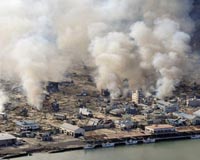| . |  |
. |
Washington (AFP) March 15, 2011 While the world is focused on the human tragedy in Japan, the mega-disaster may also bring a diplomatic opening as the United States and neighbors reach out to the newly vulnerable nation. The United States, whose relations with its longtime ally have been strained over military issues, has mounted a wide-scale relief effort dubbed "Operation Tomodachi" -- the Japanese word for friendship. South Korea, where memories of Japanese colonial rule remain vivid, has seen an outpouring of sympathy and assistance for quake victims. China and Russia, which both have rocky relations with Japan, have also offered support. "For most of the post-war period, Japan was seen as this economic behemoth in the region, an extremely prosperous country that had it all," said Weston Konishi, an Asia expert at the Institute for Foreign Policy Analysis. "I think the image of Japan may have changed in the eyes of its regional neighbors. It is no longer all-powerful Japan, but a country that really needs their help," he said. "Particularly in South Korea, I think there is genuine sympathy, and I think that can play into a thawing of diplomatic relations and perhaps lead to more reconciled dynamics," he said. In China, Premier Wen Jiabao has offered any assistance needed. But the rescue teams from China are much smaller than those from South Korea and the United States, and Beijing has concentrated on the safety of its own nationals. Japan, which experiences 20 percent of the world's strong earthquakes, has itself played a prominent role in disaster relief in the past, sending teams after tragedies including the 2004 Indian Ocean tsunami and the 2008 earthquake in China's Sichuan. Secretary of State Hillary Clinton, meeting Tuesday in Paris with Japanese Foreign Minister Takeaki Matsumoto, said that Japan "is always a very generous donor to any disaster anywhere in the world." "Today, the world comes together to support Japan in its hour of need," Clinton said. The US military has mobilized helicopters, planes and a dozen ships for Operation Tomodachi, delivering food, water and other supplies. US civilian crews are searching rubble for survivors. The United States and Japan have a six-decade alliance but relations have been strained since a left-leaning government took charge in Tokyo in 2009 and sought to remove the controversial Futenma military base from Okinawa island. Forces from Futenma have been involved in relief and Kevin Maher, a State Department official demoted last week for remarks on Okinawa, has helped coordinate the US response, according to people with knowledge of operations. Long before Friday's 9.0-magnitude earthquake, John Roos, the US ambassador to Japan, has been pointing out to Japanese audiences that the troops in Okinawa have saved an untold number of lives in disaster deployments. "It may well be that this will have a more direct impact on Japanese thinking than when disasters are far away in Southeast Asia," said Bruce Klingner, a senior research fellow at the conservative Heritage Foundation. He expected many Japanese to remain opposed to the Futenma base and to argue that US troops could also provide relief from the US territory of Guam, where some 8,000 Marines from Okinawa are scheduled to move by 2014. Testifying before Congress on Tuesday, senior Pentagon official Michael Schiffer said that the US ability to respond to crises "rests in no small part on the maintenance of rapidly deployable ground forces in the region." Regardless of the particulars on the base issue, the United States has given Japan confidence in the strength of the alliance, said Sheila Smith, a senior fellow at the Council on Foreign Relations. "The base issue of course has complications that need to be resolved and worked through, but I don't think there's anybody in Japan right now who is doubting that the US military is serving their interests at the moment," Smith said. Russia, which has increasingly flexed its muscles over an island dispute with Japan, also sent rescue teams to Japan and pledged energy to make up for shortfalls in the island nation. Japan also received rare conciliatory words from arch-enemy North Korea, with state media carrying a condolence message to the Japanese Red Cross Society.
Share This Article With Planet Earth
Related Links Learn about the Superpowers of the 21st Century at SpaceWar.com Learn about nuclear weapons doctrine and defense at SpaceWar.com
 Commentary: Perfect global storm
Commentary: Perfect global stormWashington (UPI) Mar 15, 2011 It appeared to be the first global storm since World War II, a commingling of unrelated disasters. For Japan, it was 9/11-plus, the worst disaster since U.S. atomic bombs leveled Hiroshima and Nagasaki 65 years ago and sealed the end of the second world war in the 20th century. More than 10,000 Japanese drowned as their homes, automobiles and boats were swallowed by gigantic wave ... read more |
|
| The content herein, unless otherwise known to be public domain, are Copyright 1995-2010 - SpaceDaily. AFP and UPI Wire Stories are copyright Agence France-Presse and United Press International. ESA Portal Reports are copyright European Space Agency. All NASA sourced material is public domain. Additional copyrights may apply in whole or part to other bona fide parties. Advertising does not imply endorsement,agreement or approval of any opinions, statements or information provided by SpaceDaily on any Web page published or hosted by SpaceDaily. Privacy Statement |